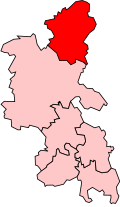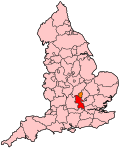Milton Keynes was a borough constituency represented in the House of Commons of the Parliament of the United Kingdom from 1983 until 1992.
| Milton Keynes | |
|---|---|
| Former borough constituency for the House of Commons | |
 Boundary of Milton Keynes in Buckinghamshire for the 1987 general election | |
 Location of Buckinghamshire within England | |
| County | Buckinghamshire |
| Major settlements | Milton Keynes |
| 1983–1992 | |
| Seats | One |
| Created from | Buckingham |
| Replaced by | North East Milton Keynes and Milton Keynes South West |
It covered much of the then recently created Borough of Milton Keynes in Buckinghamshire, including most of the 1967 designated area of Milton Keynes together with Newport Pagnell, Olney and the rural area to the north of Milton Keynes. Three wards in the northwest of the borough were excluded.
History
editThe Borough of Milton Keynes was established in 1974 by the Local Government Act 1972, seven years after Milton Keynes was designated as a New Town. Before 1983, the Borough was part of the Buckingham constituency; however, its population had expanded to such an extent that the new constituency of Milton Keynes was created for the 1983 general election. It comprised the Borough of Milton Keynes, except for the wards of Stony Stratford, Wolverton and Wolverton Stacey Bushes, which were retained by Buckingham.
The sitting Buckingham MP, William Benyon of the Conservative Party, was elected for the new seat, and was its only ever MP.
Uniquely outside the normal cycle of periodic reviews by the Boundaries Commission, Milton Keynes was split into two constituencies for the 1992 general election: North East Milton Keynes and Milton Keynes South West.[1]
Boundaries
editThe Borough of Milton Keynes wards of Bradwell, Church Green, Danesborough, Denbigh, Eaton, Fenny Stratford, Lavendon, Linford, Loughton, Manor Farm, Newport Pagnell, Newton, Olney, Pineham, Sherington, Stantonbury, Whaddon, Woburn Sands, and Woughton.[2]
Members of Parliament
edit| Election | Member [3] | Party | |
|---|---|---|---|
| 1983 | William Benyon | Conservative | |
| 1992 | constituency divided | ||
Elections
edit| Party | Candidate | Votes | % | ±% | |
|---|---|---|---|---|---|
| Conservative | William Benyon | 28,181 | 48.0 | ||
| SDP | Janet Nightingale | 16,659 | 28.3 | ||
| Labour | James Thakoordin | 13,045 | 22.2 | ||
| Ecology | A H Francis | 494 | 0.8 | ||
| BNP | Ronald G W Rickcord | 290 | 0.5 | ||
| Majority | 11,522 | 19.7 | |||
| Turnout | 58,669 | 74.0 | |||
| Conservative win (new seat) | |||||
| Party | Candidate | Votes | % | ±% | |
|---|---|---|---|---|---|
| Conservative | William Benyon | 35,396 | 47.8 | −0.2 | |
| SDP | Bill Rodgers | 21,695 | 29.3 | +1.0 | |
| Labour | Yvonne Brownfield-Pope | 16,111 | 21.8 | −0.4 | |
| Green | Alan Francis | 810 | 1.1 | +0.3 | |
| Majority | 13,701 | 18.5 | −1.2 | ||
| Turnout | 74,012 | 76.3 | +2.3 | ||
| Conservative hold | Swing | ||||
References
edit- ^ "The Parliamentary Constituencies (England) (Miscellaneous Changes) Order 1990". www.legislation.gov.uk. Retrieved 8 February 2019.
- ^ "The Parliamentary Constituencies (England) Order 1983". www.legislation.gov.uk. Retrieved 8 February 2019.
- ^ Leigh Rayment's Historical List of MPs – Constituencies beginning with "M" (part 2)
- ^ "Election Data 1983". Electoral Calculus. Archived from the original on 15 October 2011. Retrieved 28 June 2017.
- ^ "Election Data 1987". Electoral Calculus. Archived from the original on 15 October 2011. Retrieved 28 June 2017.